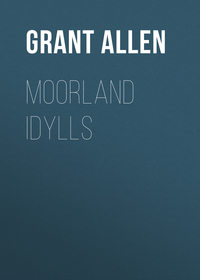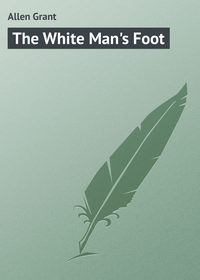 полная версия
полная версияStrange Stories
"Dear Mrs. Carvalho," I cried, clasping my hands before her, "do hear me, I entreat you; do let me explain to you how it all happened."
"There is no explanation possible," she answered sternly. "Go. You have wrecked a life that might otherwise have been happy and famous, and then you come to a mother with an explanation!"
"That letter was not mine," I said boldly; for I saw that to put the truth shortly in that truest and briefest form was the only way of getting her to listen to me now.
She sank back in a chair and folded her hands faintly one above the other. "Tell me it all," she said in a weak voice. "I will hear you."
So I told her all. I did not try to extenuate my own weakness in writing from my mother's dictation; but I let her see what I had suffered then and what I had suffered since. When I had finished, she drew me towards her gently, and printed one kiss upon my forehead. "It is hard to forget," she said softly, "but you were very young and helpless, and your mother was a terrible woman. The iron has entered into your own soul too. Go home, dear, and I will see about this matter."
We fell upon one another's necks, the Palmettos slave-girl and I, and cried together glad tears for ten minutes. Then I wiped my red eyes dry, covered them with a double fold of my veil, and ran home hurriedly in the dusk to auntie's. It was such a terrible relief to have got it all over.
That evening, about eleven o'clock, auntie had gone to bed, and I was sitting up by myself, musing late over the red cinders in the little back drawing-room grate. I felt as though I couldn't sleep, and so I was waiting up till I got sleepy. Suddenly there came a loud knock and a ring at the bell, after which Amelia ran in to say that a gentleman wanted to see me in the dining-room on urgent business, and would I please come down to speak with him immediately. I knew at once it was Ernest.
The moment I entered the room, he never said a word, but he took my two hands eagerly in his, and then he kissed me fervently on the lips half a dozen times over. "And now, Edith," he said, "we need say no more about the past, for my mother has explained it all to me; we will only think about the future."
I have no distinct recollection what o'clock it was before Ernest left that evening; but I know auntie sent down word twice to say it was high time I went to bed, and poor Amelia looked awfully tired and very sleepy. However, it was settled then and there that Ernest and I should be married early in October.
A few days later, after the engagement had been announced to all our friends, dear Mrs. Bouverie Barton paid me a congratulatory call. "You are a very lucky girl, my dear," she said to me kindly. "We are half envious of you; I wish we could find another such husband as Mr. Carvalho for my Christina. But you have carried off the prize of the season, and you are well worthy of him. It is a very great honour for any girl to win and deserve the love of such a man as Ernest Carvalho."
Will you believe it, so strangely do one's first impressions and early ideas about people cling to one, that though I had often felt before how completely the tables had been turned since we two came to England, it had not struck me till that moment that in the eyes of the world at large it was Ernest who was doing an honour to me and not I who was doing an honour to Ernest. I felt ashamed to think that Mrs. Bouverie Barton should see instinctively the true state of the case, while I, who loved and admired him so greatly, should have let the shadow of that old prejudice stand even now between me and the lover I was so proud to own. But when I took dear old Mrs. Carvalho's hand in mine the day of our wedding, and kissed her, and called her mother for the first time, I felt that I had left the guilt and shame of slavery for ever behind me, and that I should strive ever after to live worthily of Ernest Carvalho's love.
PAUSODYNE:
A GREAT CHEMICAL DISCOVERY
Walking along the Strand one evening last year towards Pall Mall, I was accosted near Charing Cross Station by a strange-looking, middle-aged man in a poor suit of clothes, who surprised and startled me by asking if I could tell him from what inn the coach usually started for York.
"Dear me!" I said, a little puzzled. "I didn't know there was a coach to York. Indeed, I'm almost certain there isn't one."
The man looked puzzled and surprised in turn. "No coach to York?" he muttered to himself, half inarticulately. "No coach to York? How things have changed! I wonder whether nobody ever goes to York nowadays!"
"Pardon me," I said, anxious to discover what could be his meaning; "many people go to York every day, but of course they go by rail."
"Ah, yes," he answered softly, "I see. Yes, of course, they go by rail. They go by rail, no doubt. How very stupid of me!" And he turned on his heel as if to get away from me as quickly as possible.
I can't exactly say why, but I felt instinctively that this curious stranger was trying to conceal from me his ignorance of what a railway really was. I was quite certain from the way in which he spoke that he had not the slightest conception what I meant, and that he was doing his best to hide his confusion by pretending to understand me. Here was indeed a strange mystery. In the latter end of this nineteenth century, in the metropolis of industrial England, within a stone's-throw of Charing Cross terminus, I had met an adult Englishman who apparently did not know of the existence of railways. My curiosity was too much piqued to let the matter rest there. I must find out what he meant by it. I walked after him hastily, as he tried to disappear among the crowd, and laid my hand upon his shoulder, to his evident chagrin.
"Excuse me," I said, drawing him aside down the corner of Craven Street; "you did not understand what I meant when I said people went to York by rail?"
He looked in my face steadily, and then, instead of replying to my remark, he said slowly, "Your name is Spottiswood, I believe?"
Again I gave a start of surprise. "It is," I answered; "but I never remember to have seen you before."
"No," he replied dreamily; "no, we have never met till now, no doubt; but I knew your father, I'm sure; or perhaps it may have been your grandfather."
"Not my grandfather, certainly," said I, "for he was killed at Waterloo."
"At Waterloo! Indeed! How long since, pray?"
I could not refrain from laughing outright. "Why, of course," I answered, "in 1815. There has been nothing particular to kill off any large number of Englishmen at Waterloo since the year of the battle, I suppose."
"True," he muttered, "quite true; so I should have fancied." But I saw again from the cloud of doubt and bewilderment which came over his intelligent face that the name of Waterloo conveyed no idea whatsoever to his mind.
Never in my life had I felt so utterly confused and astonished. In spite of his poor dress, I could easily see from the clear-cut face and the refined accent of my strange acquaintance that he was an educated gentleman – a man accustomed to mix in cultivated society. Yet he clearly knew nothing whatsoever about railways, and was ignorant of the most salient facts in English history. Had I suddenly come across some Caspar Hauser, immured for years in a private prison, and just let loose upon the world by his gaolers? or was my mysterious stranger one of the Seven Sleepers of Ephesus, turned out unexpectedly in modern costume on the streets of London? I don't suppose there exists on earth a man more utterly free than I am from any tinge of superstition, any lingering touch of a love for the miraculous; but I confess for a moment I felt half inclined to suppose that the man before me must have drunk the elixir of life, or must have dropped suddenly upon earth from some distant planet.
The impulse to fathom this mystery was irresistible. I drew my arm through his. "If you knew my father," I said, "you will not object to come into my chambers and take a glass of wine with me."
"Thank you," he answered half suspiciously; "thank you very much. I think you look like a man who can be trusted, and I will go with you."
We walked along the Embankment to Adelphi Terrace, where I took him up to my rooms, and seated him in my easy-chair near the window. As he sat down, one of the trains on the Metropolitan line whirred past the Terrace, snorting steam and whistling shrilly, after the fashion of Metropolitan engines generally. My mysterious stranger jumped back in alarm, and seemed to be afraid of some immediate catastrophe. There was absolutely no possibility of doubting it. The man had obviously never seen a locomotive before.
"Evidently," I said, "you do not know London. I suppose you are a colonist from some remote district, perhaps an Australian from the interior somewhere, just landed at the Tower?"
"No, not an Austrian" – I noted his misapprehension – "but a Londoner born and bred."
"How is it, then, that you seem never to have seen an engine before?"
"Can I trust you?" he asked in a piteously plaintive, half-terrified tone. "If I tell you all about it, will you at least not aid in persecuting and imprisoning me?"
I was touched by his evident grief and terror. "No," I answered, "you may trust me implicitly. I feel sure there is something in your history which entitles you to sympathy and protection."
"Well," he replied, grasping my hand warmly, "I will tell you all my story; but you must be prepared for something almost too startling to be credible."
"My name is Jonathan Spottiswood," he began calmly.
Again I experienced a marvellous start: Jonathan Spottiswood was the name of my great-great-uncle, whose unaccountable disappearance from London just a century since had involved our family in so much protracted litigation as to the succession to his property. In fact, it was Jonathan Spottiswood's money which at that moment formed the bulk of my little fortune. But I would not interrupt him, so great was my anxiety to hear the story of his life.
"I was born in London," he went on, "in 1750. If you can hear me say that and yet believe that possibly I am not a madman, I will tell you the rest of my tale; if not, I shall go at once and for ever."
"I suspend judgment for the present," I answered. "What you say is extraordinary, but not more extraordinary perhaps than the clear anachronism of your ignorance about locomotives in the midst of the present century."
"So be it, then. Well, I will tell you the facts briefly in as few words as I can. I was always much given to experimental philosophy, and I spent most of my time in the little laboratory which I had built for myself behind my father's house in the Strand. I had a small independent fortune of my own, left me by an uncle who had made successful ventures in the China trade; and as I was indisposed to follow my father's profession of solicitor, I gave myself up almost entirely to the pursuit of natural philosophy, following the researches of the great Mr. Cavendish, our chief English thinker in this kind, as well as of Monsieur Lavoisier, the ingenious French chemist, and of my friend Dr. Priestley, the Birmingham philosopher, whose new theory of phlogiston I have been much concerned to consider and to promulgate. But the especial subject to which I devoted myself was the elucidation of the nature of fixed air. I do not know how far you yourself may happen to have heard respecting these late discoveries in chemical science, but I dare venture to say that you are at least acquainted with the nature of the body to which I refer."
"Perfectly," I answered with a smile, "though your terminology is now a little out of date. Fixed air was, I believe, the old-fashioned name for carbonic acid gas."
"Ah," he cried vehemently, "that accursed word again! Carbonic acid has undone me, clearly. Yes, if you will have it so, that seems to be what they call it in this extraordinary century; but fixed air was the name we used to give it in our time, and fixed air is what I must call it, of course, in telling you my story. Well, I was deeply interested in this curious question, and also in some of the results which I obtained from working with fixed air in combination with a substance I had produced from the essential oil of a weed known to us in England as lady's mantle, but which the learned Mr. Carl Linnæus describes in his system as Alchemilla vulgaris. From that weed I obtained an oil which I combined with a certain decoction of fixed air into a remarkable compound; and to this compound, from its singular properties, I proposed to give the name of Pausodyne. For some years I was almost wholly engaged in investigating the conduct of this remarkable agent; and lest I should weary you by entering into too much detail, I may as well say at once that it possessed the singular power of entirely suspending animation in men or animals for several hours together. It is a highly volatile oil, like ammonia in smell, but much thicker in gravity; and when held to the nose of an animal, it causes immediate stoppage of the heart's action, making the body seem quite dead for long periods at a time. But the moment a mixture of the pausodyne with oil of vitriol and gum resin is presented to the nostrils, the animal instantaneously revives exactly as before, showing no evil effects whatsoever from its temporary simulation of death. To the reviving mixture I have given the appropriate name of Anegeiric.
"Of course you will instantly see the valuable medical applications which may be made of such an agent. I used it at first for experimenting upon the amputation of limbs and other surgical operations. It succeeded admirably. I found that a dog under the influence of pausodyne suffered his leg, which had been broken in a street accident, to be set and spliced without the slightest symptom of feeling or discomfort. A cat, shot with a pistol by a cruel boy, had the bullet extracted without moving a muscle. My assistant, having allowed his little finger to mortify from neglect of a burn, permitted me to try the effect of my discovery upon himself; and I removed the injured joints while he remained in a state of complete insensibility, so that he could hardly believe afterwards in the actual truth of their removal. I felt certain that I had invented a medical process of the very highest and greatest utility.
"All this took place in or before the year 1781. How long ago that may be according to your modern reckoning I cannot say; but to me it seems hardly more than a few months since. Perhaps you would not mind telling me the date of the current year. I have never been able to ascertain it."
"This is 1881," I said, growing every moment more interested in his tale.
"Thank you. I gathered that we must now be somewhere near the close of the nineteenth century, though I could not learn the exact date with certainty. Well, I should tell you, my dear sir, that I had contracted an engagement about the year 1779 with a young lady of most remarkable beauty and attractive mental gifts, a Miss Amelia Spragg, daughter of the well-known General Sir Thomas Spragg, with whose achievements you are doubtless familiar. Pardon me, my friend of another age, pardon me, I beg of you, if I cannot allude to this subject without emotion after a lapse of time which to you doubtless seems like a century, but is to me a matter of some few months only at the utmost. I feel towards her as towards one whom I have but recently lost, though I now find that she has been dead for more than eighty years." As he spoke, the tears came into his eyes profusely; and I could see that under the external calmness and quaintness of his eighteenth century language and demeanour his whole nature was profoundly stirred at the thought of his lost love.
"Look here," he continued, taking from his breast a large, old-fashioned gold locket containing a miniature; "that is her portrait, by Mr. Walker, and a very truthful likeness indeed. They left me that when they took away my clothes at the Asylum, for I would not consent to part with it, and the physician in attendance observed that to deprive me of it might only increase the frequency and violence of my paroxysms. For I will not conceal from you the fact that I have just escaped from a pauper lunatic establishment."
I took the miniature which he handed me, and looked at it closely. It was the picture of a young and beautiful girl, with the features and costume of a Sir Joshua. I recognized the face at once as that of a lady whose portrait by Gainsborough hangs on the walls of my uncle's dining-room at Whittingham Abbey. It was strange indeed to hear a living man speak of himself as the former lover of this, to me, historic personage.
"Sir Thomas, however," he went on, "was much opposed to our union, on the ground of some real or fancied social disparity in our positions; but I at last obtained his conditional consent, if only I could succeed in obtaining the Fellowship of the Royal Society, which might, he thought, be accepted as a passport into that fashionable circle of which he was a member. Spurred on by this ambition, and by the encouragement of my Amelia, I worked day and night at the perfectioning of my great discovery, which I was assured would bring not only honour and dignity to myself, but also the alleviation and assuagement of pain to countless thousands of my fellow-creatures. I concealed the nature of my experiments, however, lest any rival investigator should enter the field with me prematurely, and share the credit to which I alone was really entitled. For some months I was successful in my efforts at concealment; but in March of this year – I mistake; of the year 1781, I should say – an unfortunate circumstance caused me to take special and exceptional precautions against intrusion.
"I was then conducting my experiments upon living animals, and especially upon the extirpation of certain painful internal diseases to which they are subject. I had a number of suffering cats in my laboratory, which I had treated with pausodyne, and stretched out on boards for the purpose of removing the tumours with which they were afflicted. I had no doubt that in this manner, while directly benefiting the animal creation, I should indirectly obtain the necessary skill to operate successfully upon human beings in similar circumstances. Already I had completely cured several cats without any pain whatsoever, and I was anxious to proceed to the human subject. Walking one morning in the Strand, I found a beggar woman outside a gin-shop, quite drunk, with a small, ill-clad child by her side, suffering the most excruciating torments from a perfectly remediable cause. I induced the mother to accompany me to my laboratory, and there I treated the poor little creature with pausodyne, and began to operate upon her with perfect confidence of success.
"Unhappily, my laboratory had excited the suspicion of many ill-disposed persons among the low mob of the neighbourhood. It was whispered abroad that I was what they called a vivisectionist; and these people, who would willingly have attended a bull-baiting or a prize fight, found themselves of a sudden wondrous humane when scientific procedure was under consideration. Besides, I had made myself unpopular by receiving visits from my friend Dr. Priestley, whose religious opinions were not satisfactory to the strict orthodoxy of St. Giles's. I was rumoured to be a philosopher, a torturer of live animals, and an atheist. Whether the former accusation were true or not, let others decide; the two latter, heaven be my witness, were wholly unfounded. However, when the neighbouring rabble saw a drunken woman with a little girl entering my door, a report got abroad at once that I was going to vivisect a Christian child. The mob soon collected in force, and broke into the laboratory. At that moment I was engaged, with my assistant, in operating upon the girl, while several cats, all completely anæstheticised, were bound down on the boards around, awaiting the healing of their wounds after the removal of tumours. At the sight of such apparent tortures the people grew wild with rage, and happening in their transports to fling down a large bottle of the anegeiric, or reviving mixture, the child and the animals all at once recovered consciousness, and began of course to writhe and scream with acute pain. I need not describe to you the scene that ensued. My laboratory was wrecked, my assistant severely injured, and I myself barely escaped with my life.
"After this contretemps I determined to be more cautious. I took the lease of a new house at Hampstead, and in the garden I determined to build myself a subterranean laboratory where I might be absolutely free from intrusion. I hired some labourers from Bath for this purpose, and I explained to them the nature of my wishes, and the absolute necessity of secrecy. A high wall surrounded the garden, and here the workmen worked securely and unseen. I concealed my design even from my dear brother – whose grandson or great-grandson I suppose you must be – and when the building was finished, I sent my men back to Bath, with strict injunctions never to mention the matter to any one. A trap-door in the cellar, artfully concealed, gave access to the passage; a large oak portal, bound with iron, shut me securely in; and my air supply was obtained by means of pipes communicating through blank spaces in the brick wall of the garden with the outer atmosphere. Every arrangement for concealment was perfect; and I resolved in future, till my results were perfectly established, that I would dispense with the aid of an assistant.
"I was in high spirits when I went to visit my Amelia that evening, and I told her confidently that before the end of the year I expected to gain the gold medal of the Royal Society. The dear girl was pleased at my glowing prospects, and gave me every assurance of the delight with which she hailed the probability of our approaching union.
"Next day I began my experiments afresh in my new quarters. I bolted myself into the laboratory, and set to work with renewed vigour. I was experimenting upon an injured dog, and I placed a large bottle of pausodyne beside me as I administered the drug to his nostrils. The rising fumes seemed to affect my head more than usual in that confined space, and I tottered a little as I worked. My arm grew weaker, and at last fell powerless to my side. As it fell it knocked down the large bottle of pausodyne, and I saw the liquid spreading over the floor. That was almost the last thing that I knew. I staggered toward the door, but did not reach it; and then I remember nothing more for a considerable period."
He wiped his forehead with his sleeve – he had no handkerchief – and then proceeded.
"When I woke up again the effects of the pausodyne had worn themselves out, and I felt that I must have remained unconscious for at least a week or a fortnight. My candle had gone out, and I could not find my tinder-box. I rose up slowly and with difficulty, for the air of the room was close and filled with fumes, and made my way in the dark towards the door. To my surprise, the bolt was so stiff with rust that it would hardly move. I opened it after a struggle, and found myself in the passage. Groping my way towards the trap-door of the cellar, I felt it was obstructed by some heavy body. With an immense effort, for my strength seemed but feeble, I pushed it up, and discovered that a heap of sea-coals lay on top of it. I extricated myself into the cellar, and there a fresh surprise awaited me. A new entrance had been made into the front, so that I walked out at once upon the open road, instead of up the stairs into the kitchen. Looking up at the exterior of my house, my brain reeled with bewilderment when I saw that it had disappeared almost entirely, and that a different porch and wholly unfamiliar windows occupied its façade. I must have slept far longer than I at first imagined – perhaps a whole year or more. A vague terror prevented me from walking up the steps of my own home. Possibly my brother, thinking me dead, might have sold the lease; possibly some stranger might resent my intrusion into the house that was now his own. At any rate, I thought it safer to walk into the road. I would go towards London, to my brother's house in St. Mary le Bone. I turned into the Hampstead Road, and directed my steps thitherward.
"Again, another surprise began to affect me with a horrible and ill-defined sense of awe. Not a single object that I saw was really familiar to me. I recognized that I was in the Hampstead Road, but it was not the Hampstead Road which I used to know before my fatal experiments. The houses were far more numerous, the trees were bigger and older. A year, nay, even a few years would not have sufficed for such a change. I began to fear that I had slept away a whole decade.









